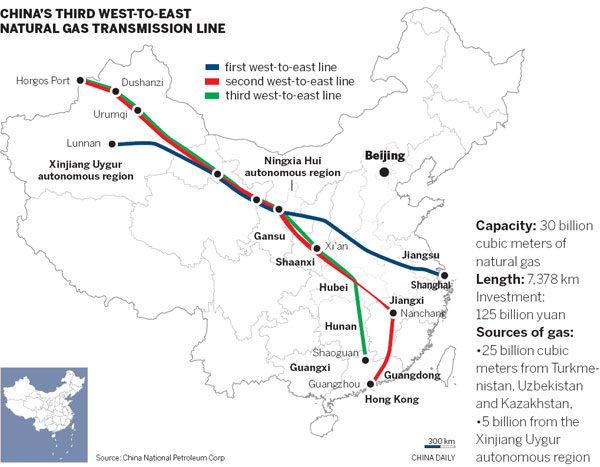
Project to bring opportunities to manufacturing, other industries
China on Tuesday began the construction of its third pipeline that will send natural gas from the nation's resource-rich western regions to the energy-starved east.
The west-to-east gas pipeline, which will cost 125 billion yuan ($20 billion), is expected to transmit 30 billion cubic meters of gas annually.
It will help transport 25 billion cubic meters of natural gas every year from Central Asia and deliver 5 billion cubic meters of coal gas from the Xinjiang Uygur autonomous region to central and eastern China, according to China National Petroleum Corp, which owns the project.
The 7,378-km pipeline will cross 10 provinces and autonomous regions, including Xinjiang, Gansu and Ningxia, having one trunk line, eight branch lines, three gas storage facilities and a liquid natural gas peak-shaving station.
The third pipeline, a project approved this year by the State Council, is expected to be completed before 2015.
"The completion of the project will help millions of people in the areas along the pipelines to use clean energy," said Vice-Premier Li Keqiang in a congratulatory letter. "It will improve China's energy structure and contribute to the country's target of reducing carbon emissions."
Meanwhile, the construction of the project will bring business opportunities to related industries such as equipment manufacturing and material technology, he said.
After completion, the project will be able to deliver 30 billion cubic meters of natural gas to the market every year, which will help raise the percentage of natural gas consumption in the country's primary energy use from the current 4.6 percent to 5.6 percent, said Liu Tienan, head of the National Energy Administration.
"Although the Chinese government is encouraging the development of shale gas, it takes time," he said. "In a very long time, China's natural gas supply will still rely on the imports."
The three main suppliers of imported natural gas delivered by the pipeline are Turkmenistan, Uzbekistan and Kazakhstan. Coal gas from Xinjiang will be the supplementary source.
Liu said China's dependency on imported natural gas will rise to 30 percent this year and it will continue to increase.
China's natural gas consumption in 2012 will reach 150 billion cubic meters, accounting for more than 5 percent among the primary energy mix, according to a report from the CNPC Economic and Technology Research Institute.
In 2011, the dependency on foreign supply was 24 percent.
China imported 12.78 million tons of natural gas in the first half of this year, up 31 percent year-on-year. CNPC, the owner of the first and second phases of the natural gas transmission project in the country, raised its share of imported natural gas in the country from 47 percent in 2011 to 61 percent during the first half .
"The project will further increase CNPC's shares in the natural gas market in the future," said Qian Li, senior industry analyst at the energy consultancy ICIS C1 Energy. "The increased natural gas use will help substitute for coal and some fuel consumption."
According to the CNPC, the project can replace 76.8 million tons of coal consumption and reduce 130 million tons of carbon emission every year.
CNPC signed with Baosteel Group Corp, the National Council for Social Security Fund and the urban infrastructure industry investment fund in May to develop the project cooperatively, which is the first time the company has allowed private capital in pipeline construction. The act is considered a move to attract social capital to enter the major fundamental projects in the country.
As the top shareholder of the joint venture company, CNPC holds a 52 percent stake.
Jiang Jiemin, chairman of PetroChina Co Ltd, CNPC's listed arm, said the fourth and fifth phases of the project are being planned, and the company is open to cooperation.
However, Qian said only a few powerful private enterprises are able to participate in the construction of such projects because of the huge investment required and long cycles.
Jiang said PetroChina will gradually build pipelines in Southwest and Northeast China and under the sea.
The first and second phases of the west-to-east gas transmission project, requiring a total investment of more than 290 billion yuan, are the largest infrastructure project in China so far. The first phase, from Xinjiang to Shanghai, began in 2002 and finished in 2004. It had delivered 138.9 billion cubic meters of natural gas by mid-October this year.
The second phase was China's first pipeline to connect overseas gas fields in Central Asia. The main part of the second phase was finished in June 2011. It had delivered 36.8 billion cubic meters of natural gas by mid-October. The branch lines will be completed by the end of this year.
Xinhua contributed to this story.
dujuan@chinadaily.com.cn
